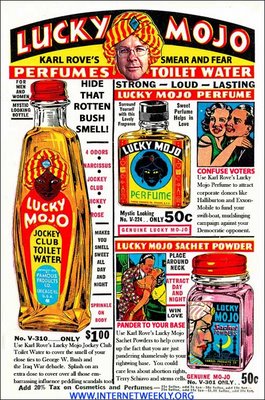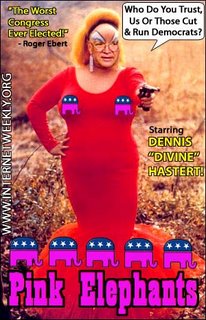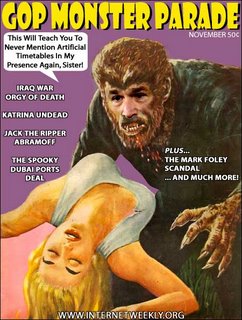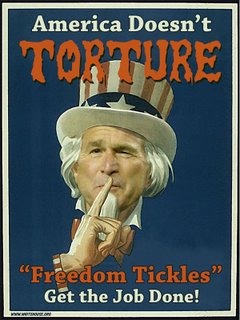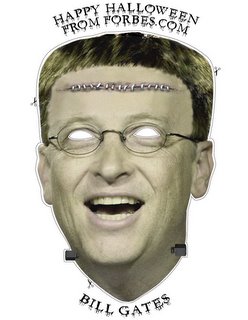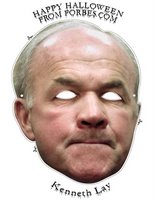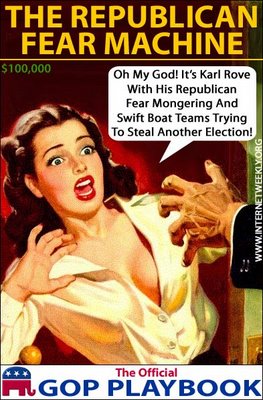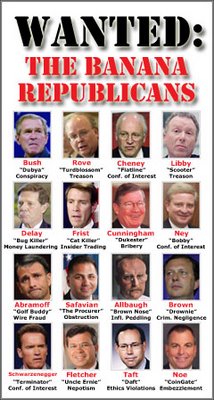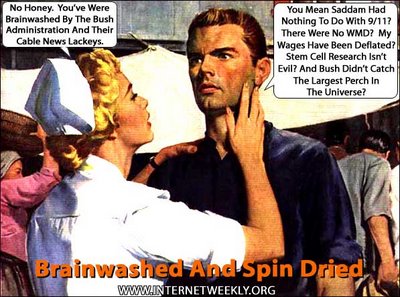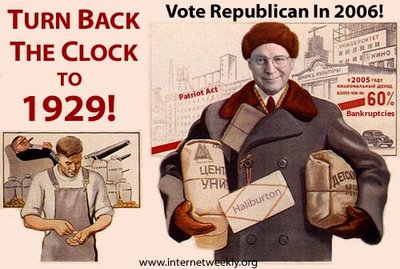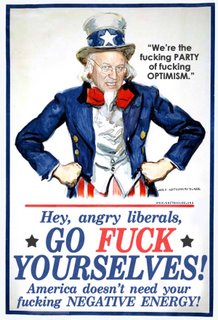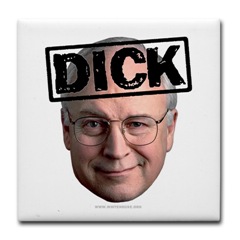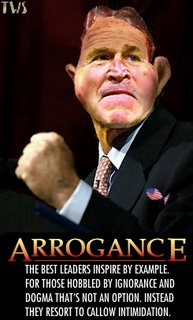Happy Halloween ~ The Season Of The Long Night Is Officially Upon Us

And there's nothing like an outsider's perspective to jolt us into realizing just what frightening fools & assholes we appear to others to be. (Title bar.)
The British view of our elections--& particularly the negative campaign ads, that are, fundamentally, our culture wars as expressed in American politics--seem not to be about the "big issues" such as invading foreign countries, or the economy or public policy--but about sex.
They may be onto something--although I personally think government has no business sticking its hands down our pants for any reason or in any guise, collectively we may just prove that our fusspot tendencies & penchant for all manner of rules where sex is concerned is far & away more important than matters more directly related to statesmanship & running a country.
An AP report today observes that "negative ads are the coin of the realm in politics, especially with only one week left in the campaign. Voters can expect to "be bombarded on television, in the mail and over the phone as political strategists make their closing arguments to a shrinking pool of those who haven't made up their minds."
"Under the terms of a 2002 campaign finance law, these messages are independent expenditures that the parties can undertake only if they do not coordinate with the candidates they are seeking to help. This type of spending by the parties on congressional campaigns is 54 percent higher than it was for the same period in the 2004 campaign season, according to data compiled by the Federal Election Commission.
"It is also decidedly more negative. In 2004, the parties spent

about $6 on ads in favor of congressional candidates for every $5 spent opposing candidates.
"At this point, Republicans have spent $87.5 million to oppose candidates and Democrats have spent $72.6 million. But the edge on negativity, according to independent analyses of the ads, goes to the GOP.
"'Negative ads only work in two situations — when you are incredibly desperate or when you're incredibly close to the end,' said Ray Seidelman, a professor of politics at Sarah Lawrence College who has studied political advertising and voter turnout.
"For example, the political ad in Tennessee against Democratic Senate candidate Harold Ford that features the blonde with a come-hither look received widespread attention. Critics denounced the ad financed by the Republican National Committee as appealing to racism because it suggested Ford, who is black, dated white women. The ad is no longer running.
Other ads are less subtle:
• The National Republican Congressional Committee has run an ad in Ohio that accuses Democrat John Cranley, a Cincinnati City councilman, of judgment that ranges from "bad to bizarre." The ad cites his vote last year on a nonbinding resolution that asked the police department to ban the use of stun guns on children under 11 years old. The measure failed 5-4 after the police department indicated that a stun gun would be an appropriate response if a child was armed.
"The NRCC tried to place an ad in New York against Democrat Michael Arcuri, the district attorney in Oneida County, accusing him of calling a sex hotline while on county business. But records show that the call to the 800 number lasted only seconds and that the number has the same last seven digits as the phone number for the state Department of Criminal Justice Services. The Arcuri campaign said a colleague of Arcuri's mistakenly placed the call.
"An analysis by the Annenberg Public Policy Center's nonpartisan FactCheck.org concluded that negative ads aired by the NRCC had a 'pronounced tendency to be petty and personal.'
"Rep. Tom Reynolds, the New York Republican who is chairman of the NRCC, said the party has chosen to run opposition ads to counter 'a full slate of undistinguished Democrat challengers campaigning on national issues with cookie-cutter talking points.'
"'The best way for us to overcome this is to draw contrasts and offer voters a true choice,' Reynolds said recently at the National Press Club. 'So, through television, radio and mail, we are saying to the voter: This is who the alternative on the ballot is; this is where he or she stands on the issues that matter in your community; and this is what he or she has done that is relevant to being qualified for federal office.'
"Democrats are running their share of negative ads. For the most part, those ads link Republican candidates to President Bush, exploiting the president's low approval ratings. One ad airing in Pennsylvania cites October as the bloodiest month in Iraq and accuses Republican incumbent Rep. Jim Gerlach (news, bio, voting record) of blindly following Bush.
"After the electronic message sex scandal involving former Rep. Mark Foley (news, bio, voting record), R-Fla., some Democratic ads connected candidates to Republican congressional leaders who were challenged for failing to address the problem.
"Meanwhile, the candidates' campaigns are generally running more positive or self-promotional ads.
"It's good cop, bad cop," said Evan Tracey, chief operating officer at TNSMI/Campaign Media Analysis Group, a company that tracks political advertising. 'The parties can throw the sharp elbows and give the candidates plausible deniability.'
"Independent groups not affiliated with the parties are adding to the negative tone on the airwaves, in mailboxes and over the phone. Labor unions, nonprofit organizations and obscure groups are reaching out to voters in competitive races with negative messages.
"One group, the Economic Freedom Fund, has been running ads and sending mail against Democratic candidates in Georgia, Iowa and West Virginia. In one mailing, the group accuses Democratic Rep. Leonard Boswell (news, bio, voting record) of Iowa of voting to let lawyers 'sue Little League for scrapes and bruises during a game.' At issue was Boswell's vote in 2004 against legislation that would have provided nonprofit athletic organizations with immunity from some negligence lawsuits. Critics of the bill argued that it would have affected other litigation, including civil rights claims.
"Strategists and political ad analysts generally agree that negative ads work because negative opinions linger with voters longer than positive opinions.
"But it works only in the narrow sense," Seidelman said. "In the long run what it does is create a tremendous amount of distrust in the process."
